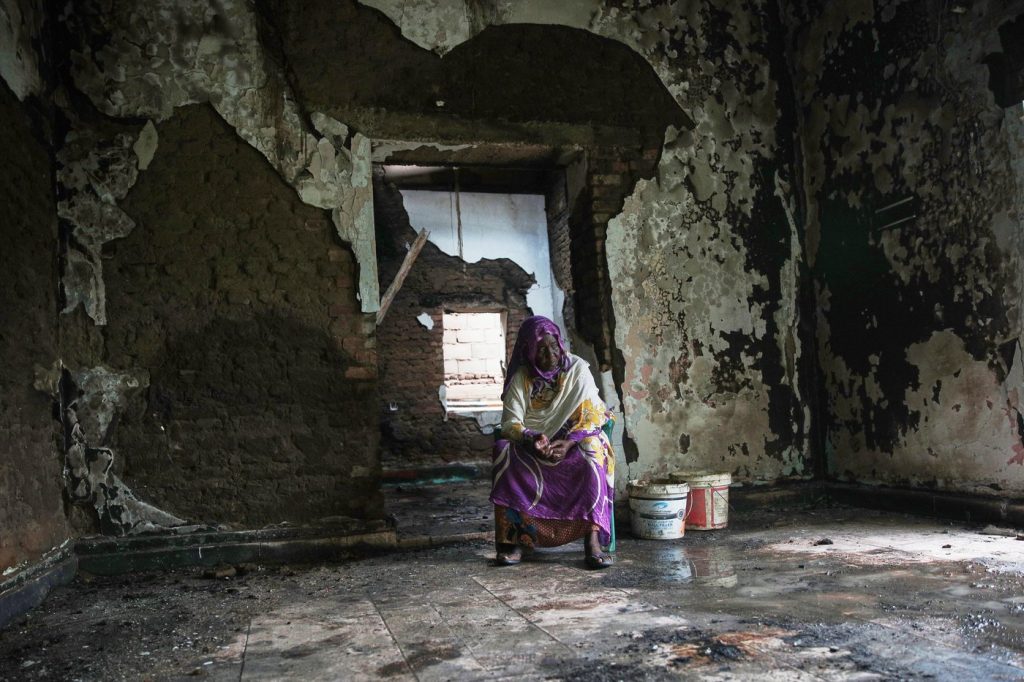KHARTOUM, Sudan (AP) – Afaf al-Tayeb’s home in Khartoum province remains a charred, windowless structure with peeling paint. In June, she returned to her property, feeling a sense of safety for the first time since the Sudanese army claimed it had retaken the capital from the rival Rapid Support Forces (RSF). Al-Tayeb, along with her son, Mohamed al-Khedr, has been forcibly displaced multiple times during the ongoing civil war in Sudan, which erupted over two years ago.
Throughout this turmoil, Al-Tayeb's family sought refuge in various parts of Khartoum, yet nothing felt as comforting as their house in the Al-Qawz district. The memories of their lost possessions, including photographs of her parents and late husband destroyed in a fire during the conflict, haunt her. The emotional impact of losing her home left Al-Tayeb in tears.
Initially, the family fled to Hilaliya in Gezira province, taking nothing but the clothes on their backs. However, as the RSF advanced, they were forced to return to Al-Qawz. Upon their return, they faced the terrifying presence of RSF fighters who raided their home, prompting the family to escape once more to eastern Khartoum, then to Shendi and Om Durman city.
Reports indicate that around 1.2 million people returned to Sudan between December 2024 and May 2025, according to estimates from the International Organization for Migration. Since the beginning of the active conflict in April 2023, the UN's refugee agency reports that over 12 million individuals have been forcibly displaced, with 3.2 million seeking refuge in neighboring countries. The conflict has resulted in more than 40,000 deaths, pushing many individuals to the brink of famine and leading to outbreaks of various diseases.
Khartoum was the initial battleground for the fighting, but the army claimed to have regained control over the capital earlier this year, including key locations like the airport and government buildings. Army chief Gen. Abdel-Fattah Burhan returned to Khartoum in March for the first time since the conflict began, after his government had previously relocated to Port Sudan on the Red Sea.
According to Mohanad Elbalal, co-founder of Khartoum Aid Kitchen, many residents who returned to recaptured areas found their homes destroyed and neighborhoods severely damaged. The situation left them with no access to electricity and scarce resources for food and water. He noted that the infrastructure in Khartoum had been severely compromised, with electric substations destroyed and vital services disrupted.
Of more than 60 water and electricity facilities harmed due to the conflict, 16 directly served Khartoum. Altyeb Saad, spokesperson for the Khartoum province government, reported that 77 power transfer stations have been looted and destroyed. Despite these challenges, officials have initiated repair work, focusing on cleaning up war remnants and restoring basic services.
Many returnees, including Al-Tayeb, face continued struggles, as even their buried valuables were stolen. The lack of water, electricity, and medical care has significantly impacted their lives, forcing them to rely on costly alternatives such as bottled drinking water and solar panels for power. Al-Tayeb expressed frustration, questioning the purpose of retaking Khartoum if residents are left without essential services for months.
Neighbors, such as Nasser al-Assad, who have been displaced multiple times, returned to similarly challenging circumstances, struggling to secure basic necessities in their damaged neighborhoods. With communal efforts lacking investment from the government, residents have taken the initiative to restore some services independently, such as rewiring electricity and accessing water wells.
Elbalal highlighted that the lack of infrastructure impedes job opportunities for residents, resulting in a heavy reliance on charity kitchens. While these kitchens served around 4,000 people daily at the peak of the conflict, current numbers have decreased, though many still depend on them for survival. Kholood Khair, the founding director of Confluence Advisory, noted that while areas are being liberated from the RSF, insecurity and disturbances, including robbery and illegal occupations, continue to escalate.
This ongoing struggle poses a significant challenge for residents aiming to rebuild their lives amidst the aftermath of the conflict. Amidst the dire circumstances, Khartoum's future remains uncertain as recovery efforts face potential setbacks and a lack of coordinated support for reconstruction.











